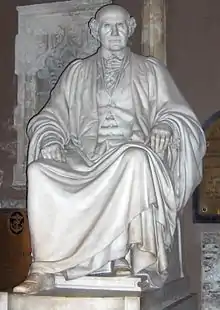James Whiteside
James Whiteside (12 August 1804 – 25 November 1876) was an Irish politician and judge.
James Whiteside | |
|---|---|
 Statue of James Whiteside by Albert Bruce-Joy in St Patrick's Cathedral, Dublin. | |
| Lord Chief Justice of Ireland | |
| In office 1866–1876 | |
| Monarch | Queen Victoria |
| Prime Minister | Earl of Derby Benjamin Disraeli |
| Attorney-General for Ireland | |
| In office 1858–1859 | |
| Solicitor-General for Ireland | |
| In office 1850–1852 | |
| University of Dublin | |
| In office 1859–1866 | |
| Enniskillen | |
| In office 1851–1859 | |
| Preceded by | Hon. Henry Arthur Cole |
| Succeeded by | Hon. John Lowry Cole |
| Personal details | |
| Born | 12 August 1804 |
| Died | 25 November 1876 (aged 72) |
| Political party | Irish Conservative Party |
| Spouse(s) | Rosetta Napier |
| Alma mater | Trinity College, Dublin |
Background and education
Whiteside was born at Delgany, County Wicklow, the son of William Whiteside, a clergyman of the Church of Ireland. His father was transferred to the parish of Rathmines, but died when his son was only two, leaving his widow in straitened circumstances. She is said to have schooled her son personally in his early years. He was educated at Trinity College, Dublin, entered the Middle Temple, and was called to the Irish bar in 1830.
Legal and judicial career
Whiteside very rapidly acquired a large practice, and after taking silk in 1842 he gained a reputation for forensic oratory surpassing that of all his contemporaries, and rivalling that of his most famous predecessors of the 18th century. He defended Daniel O'Connell in the state trial of 1843, and William Smith O'Brien in 1848; and his greatest triumph was in the Yelverton case in 1861. He was elected member for Enniskillen in 1851, and in 1859 became member for Dublin University. In Parliament, he was no less successful as a speaker than at the bar, and in 1852 was appointed Solicitor-General for Ireland in the first administration of the Earl of Derby, becoming Attorney-General for Ireland in 1858, and again in 1866. In the same year he was appointed Lord Chief Justice of the Queen's Bench, having previously turned down offers of a junior judgeship. In 1848, after a visit to Italy, he published Italy in the Nineteenth Century;[1] and in 1870 he collected and republished some papers contributed many years before to periodicals, under the title Early Sketches of Eminent Persons.
Personal life
In July 1833 Whiteside married Rosetta, daughter of William and Rosetta Napier, and sister of Sir Joseph Napier, Lord Chancellor of Ireland. He died on 25 November 1876 in Brighton, Sussex.
He was universally well liked, being noted for charm, erudition and a sense of humour. Barristers who practiced before him said that his charm, courtesy and constant flow of jokes made appearing in his Court a delightful experience.
Like his brother-in-law Joseph Napier he was devoted to the Church of Ireland, and strongly opposed its disestablishment.
References
- "Review of Italy in the Nineteenth Century, contrasted with its past Condition by James Whiteside". The Quarterly Review. 83: 552–584. September 1848.
- Andrew Shields, Irish Conservative Party, 1852–68 (Irish Academic Press, 2007)
- Webb, Alfred (1878). . A Compendium of Irish Biography. Dublin: M. H. Gill & son – via Wikisource.
 This article incorporates text from a publication now in the public domain: Chisholm, Hugh, ed. (1911). "Whiteside, James". Encyclopædia Britannica. 28 (11th ed.). Cambridge University Press.
This article incorporates text from a publication now in the public domain: Chisholm, Hugh, ed. (1911). "Whiteside, James". Encyclopædia Britannica. 28 (11th ed.). Cambridge University Press.- Falkiner, Cæsar Litton (1900). . In Lee, Sidney (ed.). Dictionary of National Biography. 61. London: Smith, Elder & Co.
- Wells, Nathan. "Whiteside, James (1804–1876)". Oxford Dictionary of National Biography (online ed.). Oxford University Press. doi:10.1093/ref:odnb/29302. (Subscription or UK public library membership required.)
External links
- Hansard 1803–2005: contributions in Parliament by James Whiteside
- Leigh Rayment's Historical List of MPs
| Parliament of the United Kingdom | ||
|---|---|---|
| Preceded by Hon. Henry Arthur Cole |
Member of Parliament for Enniskillen 1851–1859 |
Succeeded by Hon. John Lowry Cole |
| Preceded by George Alexander Hamilton Anthony Lefroy |
Member of Parliament for Dublin University 1859–1866 With: Anthony Lefroy |
Succeeded by John Edward Walsh Anthony Lefroy |
| Legal offices | ||
| Preceded by Henry George Hughes |
Solicitor-General for Ireland 1850–1852 |
Succeeded by William Keogh |
| Preceded by John David Fitzgerald |
Attorney-General for Ireland 1858–1859 |
Succeeded by John David Fitzgerald |
| Preceded by Thomas Langlois Lefroy |
Lord Chief Justice of the King's Bench for Ireland 1866–1876 |
Succeeded by George Augustus Chichester May |